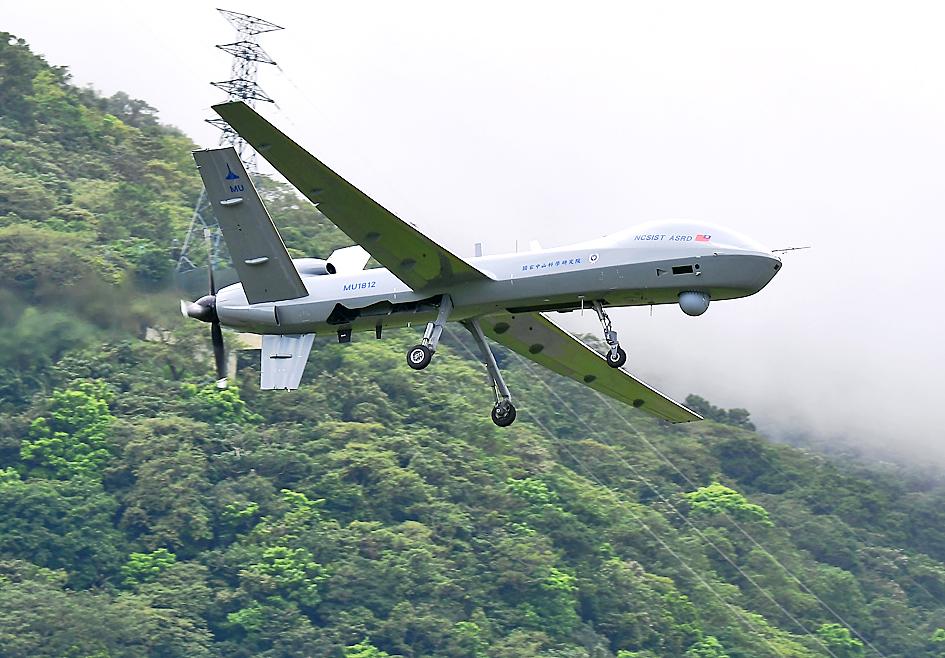The indigenous Teng Yun 2 drone showed medium and long-range flight capability, as well as guidance control over a long range, breaking an important technological barrier on its way to entering military service after its first flight over open seas, the Liberty Times (the Taipei Times’ sister newspaper) reported yesterday.
The second prototype of the tactical reconnaissance and combat drone this month conducted a series of test flights from the Chiashan Air Force Base in Hualien County.
Developed by the Chungshan Institute of Science and Technology, the Teng Yun 2, or “Cloud Rider” (騰雲二型), is a tactical uncrewed combat aerial vehicle (UCAV) designed to complement the four MQ-9B strategic drones that Taiwan’s military acquired from the US.

Photo: Yu Tai-lang, Taipei Times
The flight clearly showed the trajectory of the UCAV over nearly three hours, it said.
UCAVs have been receiving increased attention for their role in the Russia-Ukraine war, as their reconnaissance and combat abilities have granted Ukraine’s military an unforeseen advantage.
The institute has created four Teng Yun drones, two of which were developed in 2016.
Research began in 2018 on a prototype for an updated craft, which uses engines purchased from the US.
After one of the first-generation drones on Feb. 18 crash-landed in Taitung Forest Park, testing was moved to the more secure Chiashan Base for security reasons.
Defense International magazine news editor Chen Kuo-ming (陳國銘) said that due to safety reasons and limited capabilities, test flights over the ocean were previously conducted near the coast.
Testing a drone further out to sea is extremely risky, especially for as long as three hours, Chen said, adding that all communications systems must work flawlessly.
In addition to range, the institute was also testing a wide and complex array of optical sensors, radar and other systems, he said.
Hopefully, all of the technological barriers would be broken so the drone could enter service as soon as possible, he said.

‘LIKE-MINDED PARTNER’: Tako van Popta said it would be inappropriate to delay signing the deal with Taiwan because of China, adding he would promote the issue Canadian senators have stressed Taiwan’s importance for international trade and expressed enthusiasm for ensuring the Taiwan-Canada trade cooperation framework agreement is implemented this year. Representative to Canada Harry Tseng (曾厚仁) in an interview with the Central News Agency (CNA) said he was increasingly uneasy about Ottawa’s delays in signing the agreement, especially as Ottawa has warmed toward Beijing. There are “no negotiations left. Not only [is it] initialed, we have three versions of the text ready: English, French and Mandarin,” Tseng said. “That tells you how close we are to the final signature.” Tseng said that he hoped Canadian Prime Minister Mark Carney

POSITIVE DEVELOPMENT: Japan and the US are expected to hold in-depth discussions on Taiwan-related issues during the meeting next month, Japanese sources said The holding of a Japan-US leaders’ meeting ahead of US President Donald Trump’s visit to China is positive news for Taiwan, former Japan-Taiwan Exchange Association representative Hiroyasu Izumi said yesterday. After the Liberal Democratic Party’s landslide victory in Japan’s House of Representatives election, Japanese Prime Minister Sanae Takaichi is scheduled to visit the US next month, where she is to meet with Trump ahead of the US president’s planned visit to China from March 31 to April 2 for a meeting with Chinese President Xi Jinping (習近平). Japan and the US are expected to hold in-depth discussions on Taiwan-related issues during the

President William Lai (賴清德) yesterday bestowed one of Taiwan’s highest honors on Saint Vincent and the Grenadines (SVG) Ambassador Andrea Clare Bowman in recognition of her contributions to bilateral ties. “By conferring the Order of Brilliant Star with Grand Cordon on Ambassador Bowman today, I want to sincerely thank her, on behalf of the Taiwanese people, for her outstanding contribution to deepening diplomatic ties between Taiwan and SVG,” Lai said at a ceremony held at the Presidential Office in Taipei. He noted that Bowman became SVG’s first ambassador to Taiwan in 2019 and

A man walks past elementary school artworks at the Taipei Lantern Festival in Ximen District yesterday, the first day of the event. The festival is to run from 5pm to 10pm through March 15.